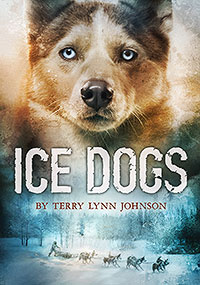Ice Dogs
by Terry Lynn Johnson
Houghton Mifflin Harcourt

I became acquainted with Terry Lynn a few years ago when she had her first book published with 4RV Publishing.
I recently won her book! I quickly read it and loved it. She really writes what she knows. She lives in Canada and has had a lot of experience with Alaskan huskies, hiking, snowshoeing and snow!
This book is full of action. It is about fourteen-year-old dog sledder Victoria Secord. She is a champion musher, independent, self-reliant and (thankfully) an expert in surviving the unforgiving Alaskan bush.
She wants to go to another dog yard and get more dogs. Her mother says, "Jeremy Cook's dogs aren't any better than the ones you already have. A dog's a dog, Vicky. And we've already got too many."
She defies her mother's orders and sets out across the snow covered wilderness to Cook's place. All the time she is getting ready she hears her deceased father's advice and packs the bag with lots of items - just in case.
An injured "city boy" and a snowstorm catch her and her dog team by surprise. She must find a way to save them all as the temperatures drop and their food runs out. They spend cold nights in the wilderness. The suspense runs throughout the story. You wonder where they will find their next food, you wonder if they can survive the cold, you wonder if the dogs are going to survive with injuries and little food.
Her love for her dogs - her heroes - grows stronger and stronger. The harsh winter elements take their toll on her, the city boy and her dogs. This suspenseful story, filled with adventure, will keep you turning the pages.
You can go here and read an excerpt of her book.
For more reviews of MG books, go to Shannon Messenger's site.
Posted byJanet Smart on Creative Writing in the Blackberry Patch.







